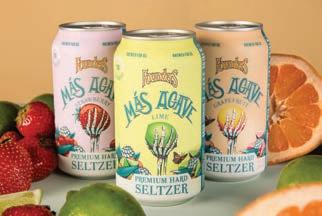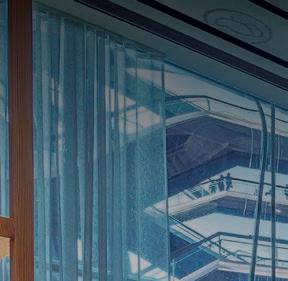
7 minute read
Happenings
HAPPENINGS O ober 2020
1
Advertisement
OCTOBER 1 NATIONAL PIZZA MONTH Turn to page 8 to check out an innovative, touch-free way to serve pizza.

OCTOBER 3 VIRUS DAY Yes, it’s a real day. If you’re looking for ways to combat the spread of COVID-19, check out our story on barriers on page 30 and on cleaning on page 34.
5
OCTOBER 5 WORLD TEACHERS DAY Teachers have had a lot thrown at them in the last few months. Offer some drink specials just for them.

OCTOBER 16 NATIONAL LIQUEUR DAY The liqueur selections are improving and growing. Try a new flavor in a cocktail. OCTOBER 19 INTERNATIONAL GIN & TONIC DAY The tonic is iconic in this drink—don’t discount the mixer! Turn to page 12 to learn more about mixer trends.

OCTOBER 20 INTERNATIONAL CHEFS DAY Honor the culinary whizzes in your venue, and read our Q&A with Chef Art Smith on page 10.


OCTOBER 31 HALLOWEEN Put the “boo” back in booze with a hair-raising cocktail menu.

OCTOBER 21 NATIONAL MEZCAL DAY Introduce your guests to tequila’s smokier cousin by working this spirit into your bar program.
21 OCTOBER 21 INTERNATIONAL NACHO DAY Celebrate with a special on this bar staple.

Upcoming EVENTS
Due to the COVID-19 pandemic, the following information is subject to change. Check trade show sites for the most up-to-date information. Visit bit.ly/2zHZ2UB for a full list of cancelled/rescheduled shows.
SEPTEMBER
TALES OF THE COCKTAIL September 21-24, 2020 Tales is switching to a completely virtual conference this year.
talesofthecocktail.org
OCTOBER
BAR CONVENT BROOKLYN BCB will be holding an all-virtual event later this year and will release more details soon.
barconventbrooklyn.com
FEBRUARY 2021
VINEXPO NEW YORK February 3-4, 2021 New York, New York
vinexponewyork.com
NEW ENGLAND FOOD SHOW February 21-23, 2021 Boston, Massachusetts
newenglandfoodshow.com
HOW TO: INSURANCE HOW TO








As bars continue to face closures and restrictions, can business interruption insurance offer relief?



As a result of the current COVID-19 pandemic, the lives we knew changed overnight. With mandatory shutdowns, stay-at-home orders, and businesses being forced to close their doors indefinitely, business owners have had to quickly adapt to a “new normal.”
Below, we will take a deep-dive into business interruption coverage, including what it is, how it can help you, and how an experienced small business claims attorney can help if the insurance company wrongfully denied your business interruption claim.
What is Business Interruption Coverage? Business interruption coverage provides protection against revenue losses that are the result of an interruption in operations. This type of policy covers the stretch of time between which the interruption began through when a business would be reasonably allowed to reopen.
COVID-19 Economic Effects As of mid-May, more than 36.5 million unemployment claims have been filed. In direct response to the pandemic and mandatory shutdowns, many employers have been forced to furlough their employees in an effort for them to be able to collect unemployment benefits. According to statistics provided by the American Property Casualty Insurance Association, the monthly losses for small businesses with less than 100 employees could reach $431 billion per month. These numbers reflect the undeniable impact the COVID-19 pandemic has had on businesses.
Filing a Business Interruption Claim as a Result of COVID-19 While none of us anticipated the dramatic fall out from the current pandemic, that doesn’t mean business owners weren’t prepared. Many businesses—both big and small— purchased business interruption insurance in the event of suspended business operations that were out of their control. And for decades, businesses have paid on these premiums without ever having to file a claim. However, in light of the high number of mandatory shutdowns, insurance companies have been denying these claims regardless of whether or not a policy includes
The language in the insurance policy is very important.
language that specifically covers business owners in the case of a pandemic.
While a business interruption policy is usually added to an existing property insurance policy, this often extends far past coverage that is limited to physical damage to the premises. This kind of coverage can extend to:
Money for fixed operating costs
Funding to set up a temporary location
While this sounds like everything a disrupted business would need to help them survive the pandemic, insurance
Payment for new, necessary training
Recovering lost profits

companies’ unilateral decision to deny these claims have unsurprisingly resulted in litigation.
Insurance Companies and Their Response to COVID-19 Claims Insurance companies are denying COVID-19-related claims and claiming that pandemics are not covered under these types of insurance policies. While many insurers do include similar language within their policies, these denials are still happening despite policies that don’t specifically exclude pandemic-related events. While viruses might be excluded, most business interruption policies have clauses that allow a claim when a state or local government uses its civil authority to bring business to a halt.
The APCIA affirms that business interruption policies were never meant to cover a widespread event like a pandemic. They claim that the accumulated losses stemming from COVID-19 is up to 72 times greater than the $6 billion per month in premiums these policies normally generate. These statistics, however, don’t account for the business owners who have paid on these premiums for decades, especially since the majority of the losses will not directly
result in business disruption claims. Lawsuits & Denied Claims A wide range of business owners who believe their insurance company
wrongfully denied their claim have started the process of filing a lawsuit—including French Laundry and Bouchon Bistro Owner Thomas Keller.
Many of these lawsuits—including the one by Keller—are seeking benefits from their policies that do not exclude pandemic-related losses. In some cases, these policies specifically included coverage for virus-related damages.
In Keller’s particular case, the fight boils down to the definition of a dangerous condition to the property. Under these so-called civil authority shutdowns, this policy, in
BEVERAGEWARE FOR THE 21ST CENTURY Never Cracks - Never Chips - Never Shatters Glasslike Appeal Impact & Shatter Resistant BPA Free & Dishwasher Safe Customizable, High Quality Beverageware

wonkyware.com | (715) 246-7979 info @ wonkyware.com

particular, kicks in when the shutdown is related to a dangerous condition on the property. Keller’s legal team argues that a dangerous pandemic applies. Insurance industry representatives have taken a different approach. They counter that these policies are tied to property insurance for a reason, and require physical damage to the building to result in a claim. Alternatively, they have argued that the general threat of a pandemic does not constitute a dangerous condition on the property. In other words, the policy would only be in effect if a business was shut down due to a specific outbreak at their location.
This brings up the importance of language in the insurance policy.
Since 2003, business interruption policies have included exclusionary language. This came on the heels of another pandemic, the SARS outbreak, which significantly changed the way insurance companies approach a pandemic. In situations where a business owner’s policy does not include virus-exclusionary language, the more likely they are to have a successful outcome in their case. However, most policies have clauses in them that will allow a claim to be filed when state or local government mandates that businesses shut their doors. An experienced attorney will be able to help you with this.
It’s important to note that every state is different, and as such, so are their handling of business interruption claims. Some states—New Jersey, Ohio, and Massachusetts, to name a few— have floated changes to these laws that would require insurance companies to provide coverage for pandemic-related closures, regardless of the specific language included in their policy. Time will tell if other states make the same aggressive decision, as well as the success of these proposed bills.
In the coming months, companies of all sizes will likely pursue legal action against their insurance providers after denying their claim.
Marrone Law Firm, LLC (marronelaw.com) understands how a pandemic shutdown can put your business at risk. Call 215-709-7360 to discuss your legal options and schedule your initial consultation. Depending on the language of your insurance policy, you might be entitled to significant compensation for a wrongful denial.










